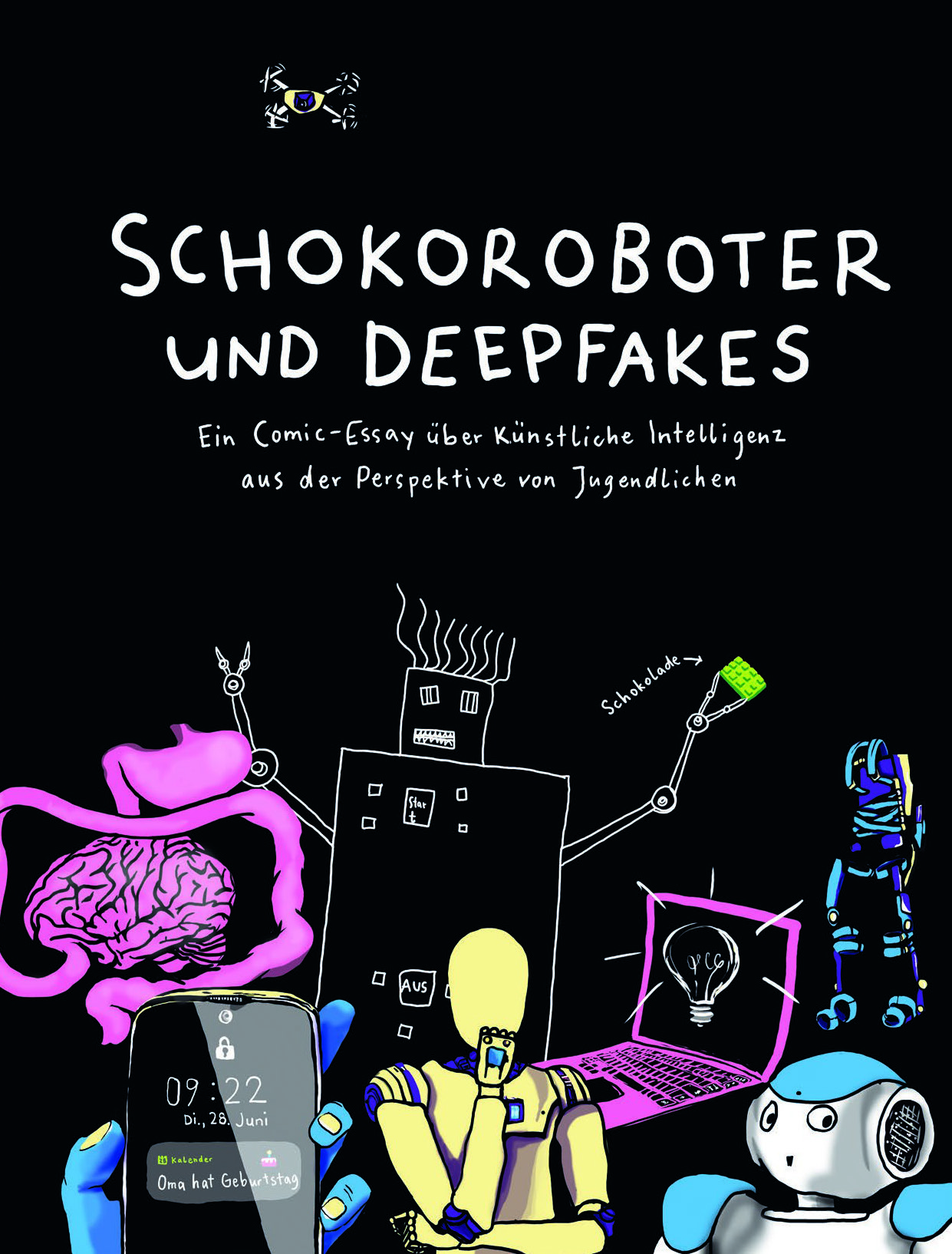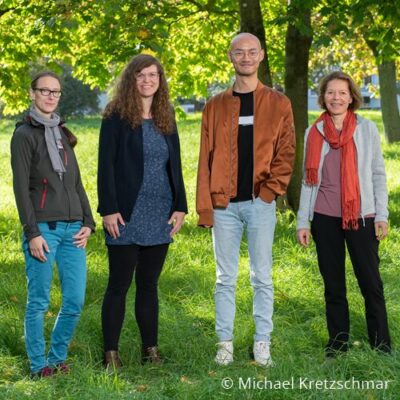Chocolate Robots and Deepfakes
What do young people think about artificial intelligence – namely, the generation whose future routine will be shaped most by AI? Tübingen AI Center has asked around 200 pupils (11-19) questions about their needs, fears and associations in terms of AI. The answers found their way into the comic Chocolate Robots and Deepfakes (German: Schokoroboter und Deepfakes) with its very own expressive visual language: a comic for juveniles, adults and researchers. A comic as a testimony of time. A comic that encourages people to participate in the debate, to be curious and to engage with AI themselves. To broaden this discussion and make it accessible to a wider audience, an exhibition was created to parallel the comic. It has been presented in its entirety or in excerpts at:
- Berlin Science Week
- Café Haag Tübingen
- ZKM Karlsruhe
- Art Museum Stuttgart
At TU Dresden, we want to pick up the thread and take up this discussion. The exhibition Chocolate Robots and Deepfakes will be on display from June 26 to July 14, 2023 in various rooms of the Faculty of Computer Science in Andreas-Pfitzmann-Bau. Both the ascii student café and the Living Lab are offering exhibition spaces.

Chocolate Robots and Deepfakes at TU Dresden
Long Night of the Sciences 2023
The midissage of the exhibition will take place at Long Night of the Sciences on June 30, 2023 at 5 p.m. Exciting inputs await us from ScaDS.AI Dresden/Leipzig initiator Prof. Dr. Wolfgang E. Nagel and Prof. Dr. Nadine Bergner, Chair for Didactics of Computer Science, Principal Investigator in ScaDS.AI Dresden/Leipzig and co-organizer of the exhibition in Dresden. At 6:30 p.m., visitors will have the opportunity to take part in a guided tour together with Kristina Laube. She is both co-author of the comic and a science communicator.
Afterwards, there will be a lecture on How AI is changing social communication – research from the Schaufler Lab@TU Dresden by Prof. Dr. Lutz Hagen, communication scientist and speaker of the Schaufler Lab@TU Dresden. At the Schaufler Lab@TU Dresden, scientists and artists deal with interactions between technology, art and science. Together they investigate questions on the topic of Artificial Intelligence as a cause and consequence of social change. The lecture will introduce the Lab and discuss relevant research taking the example of the consequences of AI for public communication.
In the framework program of the Long Night of Sciences, children and young people can experience AI up close. Guided by staff of the chair of Didactics of Computer Science, they can playfully explore the basic functions of AI at various hands-on stations.
Exhibition
During the exhibition, four different workshops will take place under the leadership of Prof. Dr. Nadine Bergner and her team. Those workshops are intended to carry on the dialogue started in Tübingen together with pupils. Computer science workshops are already running regularly at the EduInf school laboratory at TU Dresden. Other experts from the research area Responsible AI at ScaDS.AI Dresden/Leipzig are involved in the implementation, partly in collaboration with the Dresdener artist Nazanin Zandi.
The Comic
Everyone is talking about artificial intelligence: how it is changing our everyday lives, but also how it will fundamentally influence our lives in the future. But what do young people think about AI – namely, the generation whose future routine will be shaped most by AI? What problems do they believe should be solved with AI? For what should researchers be advocating? What fears do they have – and what are their needs? And what image do they associate with AI in the first place?
The outreach team of Tübingen AI Center has raised these questions and forwarded them to around 200 pupils between the ages of 11 and 19: in the form of an online survey to which researchers in machine learning from Tübingen have also contributed – sometimes in line with their specific field of research, sometimes in relation to applications, ethics or philosophy. In addition, the team visited comprehensive schools and high schools in Tübingen and Grimma in spring 2022 to engage in dialogue and collect stories. Mostly, the topic of AI came up in general terms first: from “Alexa” to “social media”. However, the discussions quickly became more multi-layered. Fears for the future, wars and social values were addressed.
Berlin-based comic essayist Julia Schneider rendered the results into trenchant comic texts. Kristina Laube, a learned journalist and science communicator at Tübingen AI Center, supplemented these with compact knowledge texts on the topics that emerged from her conversations with the young people. As a result, the comic is rich in content and owes its expressive neon-coloured imagery to the illustrator Nele Konopka. It is a comic for juveniles, adults and researchers. A comic as a testimony of time. A comic that encourages people to participate in the debate, to be curious and to engage with AI themselves. You can read the complete press release on the official website of Chocolate Robots and Deepfakes.
CitizenScience.AI
As part of the gender equality strategy of ScaDS.AI Dresden/Leipzig, CitizenScience.AI is implemented by the project team in the Office of the Equal Opportunities Officer at TU Dresden in cooperation with the research area Responsible AI.
By means of interactive formats, the connections between artificial intelligence and socially relevant topics will be reflected upon. With the focus on the group of users inside and outside the university campus, the aim is to inform and discuss the diverse possibilities, but also the limits, of AI and its influence on social processes. Various methods of sustainable learning are applied in all interactions. It is also important for us to organize and conduct an open and international dialogue about the challenges of integrating AI into different societies and cultural milieus in the context of global tensions. All this takes place in the event series Pillars and Umbrellas.



